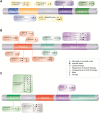Primary Coenzyme Q10 Deficiency-7 and Pathogenic COQ4 Variants: Clinical Presentation, Biochemical Analyses, and Treatment
- PMID: 35154243
- PMCID: PMC8826242
- DOI: 10.3389/fgene.2021.776807
Primary Coenzyme Q10 Deficiency-7 and Pathogenic COQ4 Variants: Clinical Presentation, Biochemical Analyses, and Treatment
Abstract
Primary Coenzyme Q10 Deficiency-7 (COQ10D7) is a rare mitochondrial disorder caused by pathogenic COQ4 variants. In this review, we discuss the correlation of COQ4 genotypes, particularly the East Asian-specific c.370G > A variant, with the clinical presentations and therapeutic effectiveness of coenzyme Q10 supplementation from an exon-dependent perspective. Pathogenic COQ4 variants in exons 1-4 are associated with less life-threating presentations, late onset, responsiveness to CoQ10 therapy, and a relatively long lifespan. In contrast, pathogenic COQ4 variants in exons 5-7 are associated with early onset, unresponsiveness to CoQ10 therapy, and early death and are more fatal. Patients with the East Asian-specific c.370G > A variant displays intermediate disease severity with multi-systemic dysfunction, which is between that of the patients with variants in exons 1-4 and 5-7. The mechanism underlying this exon-dependent genotype-phenotype correlation may be associated with the structure and function of COQ4. Sex is shown unlikely to be associated with disease severity. While point-of-care high-throughput sequencing would be useful for the rapid diagnosis of pathogenic COQ4 variants, whereas biochemical analyses of the characteristic impairments in CoQ10 biosynthesis and mitochondrial respiratory chain activity, as well as the phenotypic rescue of the CoQ10 treatment, are necessary to confirm the pathogenicity of suspicious variants. In addition to CoQ10 derivatives, targeted drugs and gene therapy could be useful treatments for COQ10D7 depending on the in-depth functional investigations and the development of gene editing technologies. This review provides a fundamental reference for the sub-classification of COQ10D7 and aim to advance our knowledge of the pathogenesis, clinical diagnosis, and prognosis of this disease and possible interventions.
Keywords: COQ4; c.370G>A variant; exon; phenotype-genotype correlation; primary coenzyme Q10 deficiency.
Copyright © 2022 Xie, Jiang and Guo.
Conflict of interest statement
The authors declare that the research was conducted in the absence of any commercial or financial relationships that could be construed as a potential conflict of interest.
Figures


Similar articles
-
Two Turkish patients with Primary Coenzyme Q10 Deficiency-7: case report and literature review.J Pediatr Endocrinol Metab. 2024 Feb 2;37(3):260-270. doi: 10.1515/jpem-2023-0490. Print 2024 Mar 25. J Pediatr Endocrinol Metab. 2024. PMID: 38353291 Review.
-
The Spectrum of clinical manifestations in newborns with the COQ4 mutation: case series and literature review.Front Pediatr. 2024 Sep 27;12:1410133. doi: 10.3389/fped.2024.1410133. eCollection 2024. Front Pediatr. 2024. PMID: 39398416 Free PMC article.
-
Epilepsy and Coenzyme Q10 deficiency with COQ4 variants.Epilepsy Behav. 2023 Dec;149:109498. doi: 10.1016/j.yebeh.2023.109498. Epub 2023 Nov 9. Epilepsy Behav. 2023. PMID: 37948995
-
[Primary coenzyme Q10 deficiency-7: a case report and literature review].Zhonghua Er Ke Za Zhi. 2020 Nov 2;58(11):928-932. doi: 10.3760/cma.j.cn112140-20200610-00601. Zhonghua Er Ke Za Zhi. 2020. PMID: 33120466 Review. Chinese.
-
Primary coenzyme Q10 deficiency-7: expanded phenotypic spectrum and a founder mutation in southern Chinese.NPJ Genom Med. 2019 Aug 5;4:18. doi: 10.1038/s41525-019-0091-x. eCollection 2019. NPJ Genom Med. 2019. PMID: 31396399 Free PMC article.
Cited by
-
Two Turkish patients with Primary Coenzyme Q10 Deficiency-7: case report and literature review.J Pediatr Endocrinol Metab. 2024 Feb 2;37(3):260-270. doi: 10.1515/jpem-2023-0490. Print 2024 Mar 25. J Pediatr Endocrinol Metab. 2024. PMID: 38353291 Review.
-
Biallelic variants in the COQ4 gene caused hereditary spastic paraplegia predominant phenotype.CNS Neurosci Ther. 2024 Apr;30(4):e14529. doi: 10.1111/cns.14529. Epub 2023 Nov 27. CNS Neurosci Ther. 2024. PMID: 38013626 Free PMC article.
-
The Spectrum of clinical manifestations in newborns with the COQ4 mutation: case series and literature review.Front Pediatr. 2024 Sep 27;12:1410133. doi: 10.3389/fped.2024.1410133. eCollection 2024. Front Pediatr. 2024. PMID: 39398416 Free PMC article.
References
-
- Alcázar-Fabra M., Rodríguez-Sánchez F., Trevisson E., Brea-Calvo G. (2021). Primary Coenzyme Q Deficiencies: A Literature Review and Online Platform of Clinical Features to Uncover Genotype-Phenotype Correlations. Free Radic. Biol. Med. 167, 141–180. 10.1016/j.freeradbiomed.2021.02.046 - DOI - PubMed
Publication types
LinkOut - more resources
Full Text Sources

